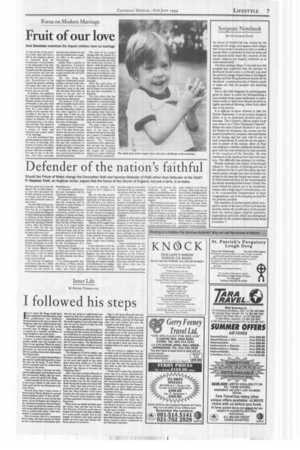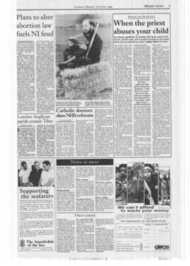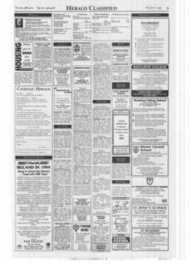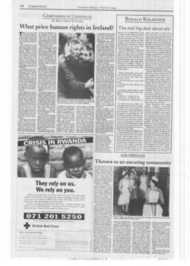Page 7, 8th July 1994
Page 7

Report an error
Noticed an error on this page?If you've noticed an error in this article please click here to report it.
Tags
Share
Related articles
Carey Calls For 'multi-faith' Coronation
Anglicans Vote To Keep State Links
Privatisation Of A King's Conviction
Charterhouse Chronicle
St Thomas More's Burial Place
Defender of the nation's faithful
Should the Prince of Wales change the Coronation Oath and become Defender of Faith rather than Defender of the Faith? Fr Stephen Trott, an Anglican rector, argues that the future of the Church of England, not just a term, is at stake.
BaXrisH COINS sTEJ. bear the legend, FD or Fidei Defensor as once they described the British monarch as Imperator lndiae, until 1947 swept away that particular claim of the Crown.
The title Fidei Defensor was awarded to Henry VIII by Pope Leo X, in recognition of a tract which the King and St John Fisher had published in defence of the Catholic teaching of Seven Sacraments, against the teaching of Martin Luther. After the Reformation, in 1544, the title was confirmed by Parliament, and has been held ever since.
HRH Prince Charles last week caused considerable speculation, especially in one Sunday newspaper, as to his future role as King in relation to the various religions now represented in this country. Hopefully it will be many years before the problem needs to be resolved.
The Church of England itself faces calls for a fresh Archbishops' Commission, to inquire into the nature of Establishment.
It is therefore unlikely that the next Coronation will be exclusively Anglican.
Ecumenical progress since 1953 makes it unthinkable that the ceremony will be reserved to senior bishops of the Church of England.
And since the Coronation is a foremost symbol for the relations of Church and State, it will inevitably form part of the Church's own deliberations.The title of Fidei Defensor was in its origins highly ironic in view of the outcome of Henry's reign. Like all the personal powers of the Reformation monarchy, it has become a symbol without authority, emptied of meaning by the development of a constitutional Crown.
The King of England can no more personally defend the faith than exercise any of the other symbolic roles thrust upon him.
It is understandable that the Prince of Wales should wish to be spared empty oaths, and avoid giving offence to subjects who belung to otha.i icligions or none.
But, as with any ancient institution, which has grown organically over the centuries, care will have to be taken in any process of devising a new coronation service, or in any measure of disestablishment for the Church of England, not to cause fatal injury to the whole in performing cosmetic surgery to the public face.
Opinion polls suggest that there is already a considerable degree of disillusionment with the very concept of monarchy. Remove too many of the symbols of monarchy, and the whole symbolic edifice might come crashing down.
It may well prove to be the case that the monarchy can not do without the Church of England, any more than the Church of England can do without Establishment. Although the tangible benefits of Establishment are negligible and are of debatable value, there remains a public percep tion that religion is somehow legitimated by its continuing association with the State.
And from the Crown's point of view, the link with the Church provides a measure of sanctification and divine sanction for the status quo. And the result of all this theoretical legitimation and sanctification is far from being ineligible.
There is still a very real attachment to the Church of England in the hearts and minds of many of this country's citizens who continue to seek baptism for their children, marriage by a priest in their parish church, and eventually a Christian funeral service.
Only a small proportion are weekly attenders at the Eucharist, but many regard themselves very much as members of the Church. Perhaps half the population has been baptised in this way. More than 100,000 marriages take place each year in Church.
There is a substantial fund of good will towards the Christian faith, which summary disestablishment or a hasty jettisoning of the coronation oaths, would gravely imperil.
The remaining character of English society as being still in some sense Christian is one which needs to be nurtured by all the Churches, not put at risk by a desire to do away "with outmoded titles, or doubtful privileges.
It would be desirable to include representatives of all major religions in the House of Lards, rather than just 26 busy Church of England bishops. It is possible to devise a fresh coronation oath in which the new King promises to defend the Christian faith, and promises his full respect for all religions.
It is hard, however, to see how the residual Christianity of England can survive the formal divorce of Church and State, which outright discstablishment or a "multi-faith monarchy" would symbolise.
blog comments powered by Disqus











